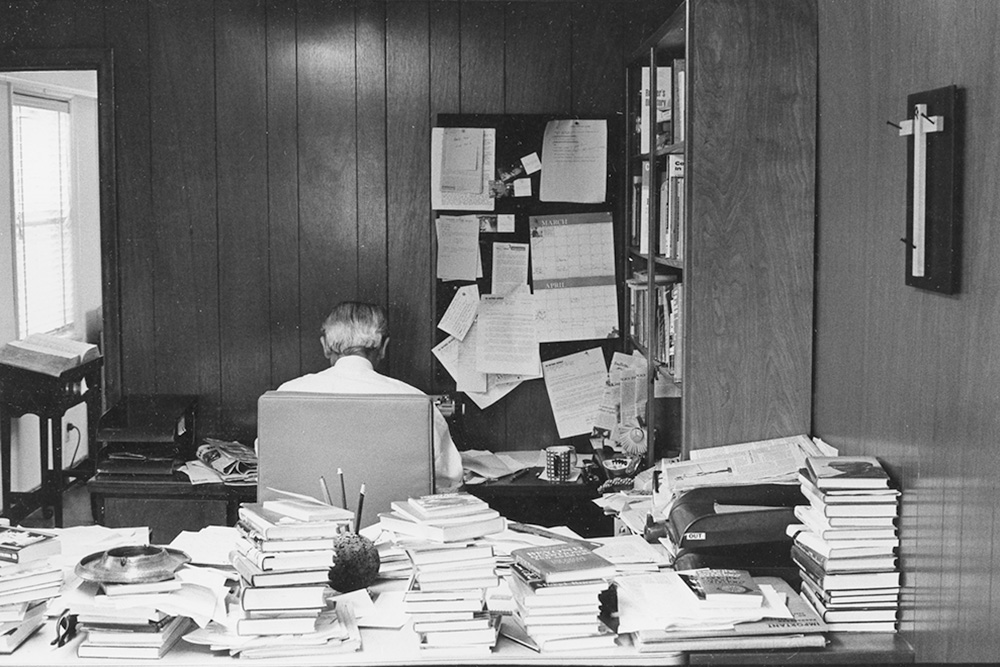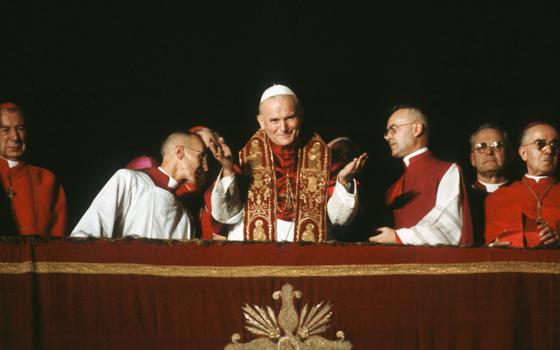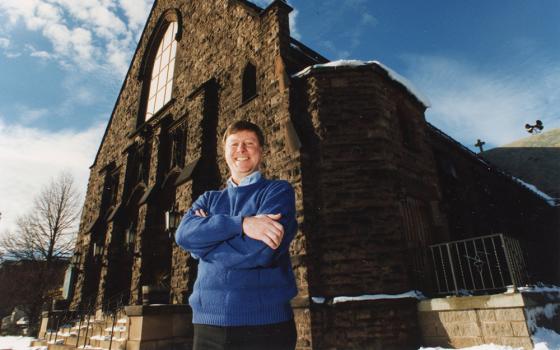
National Catholic Reporter founding editor Robert Hoyt works at NCR's offices in Kansas City, Mo., in August 1968. (NCR file photo/Jack Kenward)
It is the speech that launched this newspaper.
John Courtney Murray, a Jesuit priest and eminent theologian whose national prominence in the last century landed him on the cover of Time magazine, gave a speech in Rome in 1963 that became National Catholic Reporter's manifesto.
As recounted in our history, Beacon of Justice, Community, and Hope by Lawrence B. Guillot, Murray's speech to journalists stirred our founders to create NCR. "On the role of the press" was included in a four-page flyer issued by NCR in August 1964, to announce our own program and journalistic criteria.
It remains our guiding force today.
Consider a recent letter to the editor, the chairman of the communications committee of the U.S. Conference of Catholic Bishops scolded NCR for a recent column. The skirmish was pretty tame compared to dustups NCR has had with bishops in its history.
When such controversies arise, we often cite as our manifesto the speech given by the great Jesuit philosopher of the last century, who said the Catholic press "is not the organ of some class within the Church. It does not exist to further certain interests of the Church merely, especially if these interests be conceived in some narrow and rather sectarian sense. The Catholic press does not exist to glorify the clergy."
On the role of the press
By Fr. John Courtney Murray, SJ
Published in the National Catholic Reporter, Oct. 27, 1965
Gentlemen, you are approaching here a very difficult subject, when you undertake to discuss the function of the Catholic press within the Catholic Church, to discuss the service that the Catholic press is to render to the Church and to her members, to discuss the function that the Catholic press must play as the source of radiation of truth throughout the world. I suppose the basic difficulty arises from the fact that the Church is a unique society, a society sui generis. The Church is somewhat like and totally different from civil society. The Church has her own unique origin, her own unique purposes. She has her own structure of institutions, of government She has her own order of law. There obtains within the Church a relationship between those who rule and those who are ruled, those who teach and those who are taught. And this relationship is somewhat like and totally different from the political relationship in the civil community. There obtains within the members of the Church a bond of union which again is somewhat like and totally different from the bonds of union that bind together civil society. ...
'What is the Church doing here and now today? The people of God need to know all this.'
The Church is not democratically organized ... Within the Church, there exists among the people no right to judge, correct and direct the actions or the teaching of authority. ... Nonetheless, despite this fact, between civil society and the Church there exists this analogy. They are somewhat alike and totally different. There are points of resemblance and it might be useful to point them out
In the first place, within the Church, as within civil society, public information is a social necessity. The press performs a social function and this function is indispensable. Is it necessary to linger on this? I hope not. The Catholic free press within the Church is not some sort of luxury that is really to be frowned on. It is not a nuisance that has to be tolerated. The quest of information by the professionals of the press, by you gentlemen and ladies, this quest is not a matter of idle curiosity and your publication of the information that you collect is not pandering to curiosity. It is not a regrettable sort of indiscretion that we would rather like to stop but dare not. No, no. The Church, for all her differences as over against civil society, remains a society. And the societal character of the Church creates a public right to information about all that concerns the Church: about her teaching, about her discipline and law, about her policies, to call them that; that is to say, about the total action of the Church history, in this present moment of history. What is the Church doing here and now today? The people of God need to know all this. The subject of this right to know of course is, first of all, the people as the people. And this right derives to you and me through our membership in the people of God.
Secondly, if the function of public information in the Church is a social necessity, then the discharge of this function must be free. This public information is a response to a public need. The need is basic, essential to the Church: and the need cannot be satisfied apart from the full validity of the principle of freedom. There ought to be no arbitrary limitations imposed upon the dissemination of public information within the Church.
The Catholic press, I take it, is not the organ of some class within the Church. It does not exist to further certain interests of the Church merely, especially if these interests be conceived in some narrow and rather sectarian sense. The Catholic press does not exist to glorify the clergy. The Catholic press does not exist in order to create a public image of the Church that will be untrue to the reality of the pilgrim Church, the wayfaring Church, the Church that trudges along the road of history and gets her feet dusty at times, the Church that has hands by which she takes hold of dirty stuff of history because history is rather dirty stuff! ... If the Church is going to guide the course of history, as indeed she must, sometimes the hands of the Church — or churchmen, perhaps I should say — get dirty. And therefore this public image of the Church must be the true image, the image of the pilgrim Church, the wayfaring Church, that we have discussed in this session of Vatican II.
The Catholic press can be nothing but the vehicle of truth and of fact. Freedom therefore is the indispensable condition for the fulfillment of the social function of the Catholic press within the Church and for the Church. The freedom of the press to inform is nothing really but the other side of the rights of the people to be informed. And therefore, through the rights of the people the freedom of the press knows only one limitation, and that is the people's need to know. And I think within the Church as within civil society, the need of the people to know is in principle unlimited.
Now we must leave the realm of general theory — in which discourse of course is always easy — and come perhaps to the problems of application. This is always difficult. In the course of your meetings during these days, you will consider, I hope, many practical problems with which you are far more conversant than I.
Advertisement
A) I might however touch upon one practical problem of a certain general nature: it arises out of our own times, out of the tempo of our own times, which has been described both by Signor Manzini (editor of L' Osservatore Romano) and also by Pere Gabel (executive secretary of the International Union of the Catholic Press). This tempo of the time was noted by Pius XII in his great Christmas allocution of 1944. ... The same phenomenon had been noted in a different style and tone by John XXIII, in his great testimonial encyclical Pacem in terris, in which he left us so much the legacy of himself. He speaks here of the desires that are abroad today. He says they are the manifestations that in our time men have become more and more conscious of their dignity. And for this reason, they feel the impulse to participate in the government of the state (that is of the republic). And also, they feel the impulse to demand the rights that are their own, the rights that are inviolable. They demand that these rights be acknowledged and protected in the government of the city. Nor is this enough, nor is this all. Men today ask one thing more, namely, that those who rule the city should act according to the norms of a public constitution and that they should perform their functions within definite limits set by the constitution.
This, ladies and gentlemen, as you see, is the political phenomenon of the day. It is a phenomenon whose appearance Pius XII greeted with joy and approval. He applauded the wakening of the people from their long sleep, as he called it. For so long the people, he said, had been simply the objects of the political and the social process. Now they realize that they are to be awakened to consciousness, that they are not simply subjects of rule, they are citizens.
This, of course, as you know, is the great advance in Catholic theory made by Pius XII over Leo XIII. It is rather difficult to find in Leo XIII, for instance, the concept of citizenship. He seems to regard the people as simply the subjects of rule. This, I say, is a political phenomenon. Call it the emergence of the will to self-direction on the part of people and also on the part of individuals. Together with this will to self-direction, there has emerged the will that government should be constitutional, that it is to be limited by law, limited by the consent of the people, that government — in a word — should be on the part of the people self-government.
As a political phenomenon this is not to be deplored. It is a sign of growth, it is a sign of progress, it is a sign of maturity. It shows the flowering of the human person into a consciousness of his true dignity before God and men, and out of this consciousness of dignity there emerges the personal demand for freedom.

NCR staff members Jim Ralston, Robert Olmstead and James Andrews work on an issue at a print shop in August 1968. (NCR file photo/Jack Kenward)
B) However, this political phenomenon, it seems to me, has larger implications, to which the Church herself surely must be alert. You see, here the active self-conscious citizen within the civil community cannot be expected to be simply a passive subject within the community of the Church. The ancient symbolism of the Gospel retains all its validity of course. The symbolism, I mean, of the sheep. But this symbolism is not today to be pressed too far. We cannot consent to any schizophrenia, can we? Between civic life and Christian life, we recognize direct differences between the civil and the ecclesiastical community, but these differences must not be allowed to effect a schism within the soul of the Christian today. Here in society is the mature man or woman who cannot be considered in the Church to be an infant or an adolescent.
But you see the problem. The problem is to harmonize an affirmation of this new spirit of self-consciousness, this new will to self-direction, to harmonize this new spirit with the altogether permanently necessary affirmation of the principle of authority in the Church and with the Christian spirit of obedience. ...
All of you know this problem. You have all met it. It is all round us. There is not a sphere of life, it seems to me, in which it is not quite readily to be encountered. ... I am not going to discuss the problem. I shall merely suggest, ladies and gentlemen of the press, that the problem itself constitutes, offers an opportunity for the Catholic press, an opportunity that must be grasped. This very problem itself makes your function, the function of public information in the Church, all the more indispensable.
The opportunity briefly, I suppose, would be this: the situation now poses the necessity that the press should be the vehicle of dialogue between clergy and laity, among the laity themselves and of course between the local Churches across national boundaries.
The premise of this dialogue is evident, it seems to me. The personal will to self-direction is not incompatible at all with the principle of authority. But it is incompatible with such exercises of authority as might be arbitrary or capricious. This spirit of self-direction is incompatible with such exercises of authority as are not constitutional, that go beyond the limits that are always legitimately set to authority, so as to become an abuse of authority. Here the dialogic function of the press may do a service to the Church. The freedom of the press creates no right to stand against authority and its legitimate exercise. It does, however, create a responsibility to note abuses of authority, and thus to serve the true interests of authority. It is to the interest of authority that its method of exercise should be pure, free of all taint of the arbitrary.
Moreover, the press, as a function of information, serves the public advantage of the Church by offering a channel of communication through which the teaching of the Church, her laws, and her policies in contingent circumstances may be explained and made intelligible to the people, whose desire is to understand in order that their faith and obedience may be more profound and personal, in order that their solidarity as a people may be strengthened, in order that the sense of unity and spirit of confidence between the people and those who govern them in the name of God our Father may be more solid and operative.
'The Catholic press lives and works upon, as it were, a border line, the border line between the clergy and the laity, and more particularly the border line between the Church and the world.'
Reference has already been made here ... to certain qualities of the time in which we live. It is a time in which many complex issues confront us all; a time of rapid change. And this complicated nature of the time in which we live makes more emphatic the need of the people of God to know. To know not only the doctrine of the Church more perfectly; that, of course. Primarily to know not only the laws and the disciplines of the Church ... that too, by all means, is essential; but to know the pastoral directions in which the Church wants her people today to move.
These pastoral directions need to be made intelligible to the people, and here is where the press can play its purpose. Differences in such pastoral decisions are influenced by political considerations. The people and their pastors need to know this. If certain doctrinal orientations are considered to be dangerous — not wrong, but dangerous — the people need to know this, need to be told this.
Why? Very simply: in order that the faith and obedience may be more profound, more personal, more worthy of a Christian and more worthy of a man. The people need to know these things in order that a spirit of confidence may obtain between those who teach and rule the Church and those who are taught and ruled. This spirit of confidence must not be disturbed by misunderstanding, by the intrusion of the emotional in any sense.
The people need to know, to understand the pastoral direction of the Church today in order that the sense of unity in the Church may be all stronger and more solid and more operative, in order that the Church may be more and more fit for the perilous pilgrimage upon which she has set her feet.
It seems to me that the Catholic press lives and works upon, as it were, a border line, the border line between the clergy and the laity, and more particularly the border line between the Church and the world. The Catholic press occupies an exposed place, and therefore a perilous place. If you stand on the border line between the Church and the world, ladies and gentlemen, you must expect to be shot at from both sides. You will be; you have been, undoubtedly.
And what is your armor? I think it is twofold. First there is the armor of your Christian integrity, your faith and your loyalty to the Church. Secondly there is your professional integrity, your devotion to the ideals of your profession. And perhaps these ideals were never more perfectly expressed than by Leo XIII, when he opened the Vatican archives and laid down that rule of the historian which is the rule of the journalist to say nothing that is false and to conceal nothing that is true.
To read more about the early years of NCR, see the recently published National Catholic Reporter: Beacon of Justice, Community and Hope. You can learn more about the book at NCRonline.org/ncrbook, which includes links to outlets where you can buy the book in hardcover, paperback or e-book editions.







